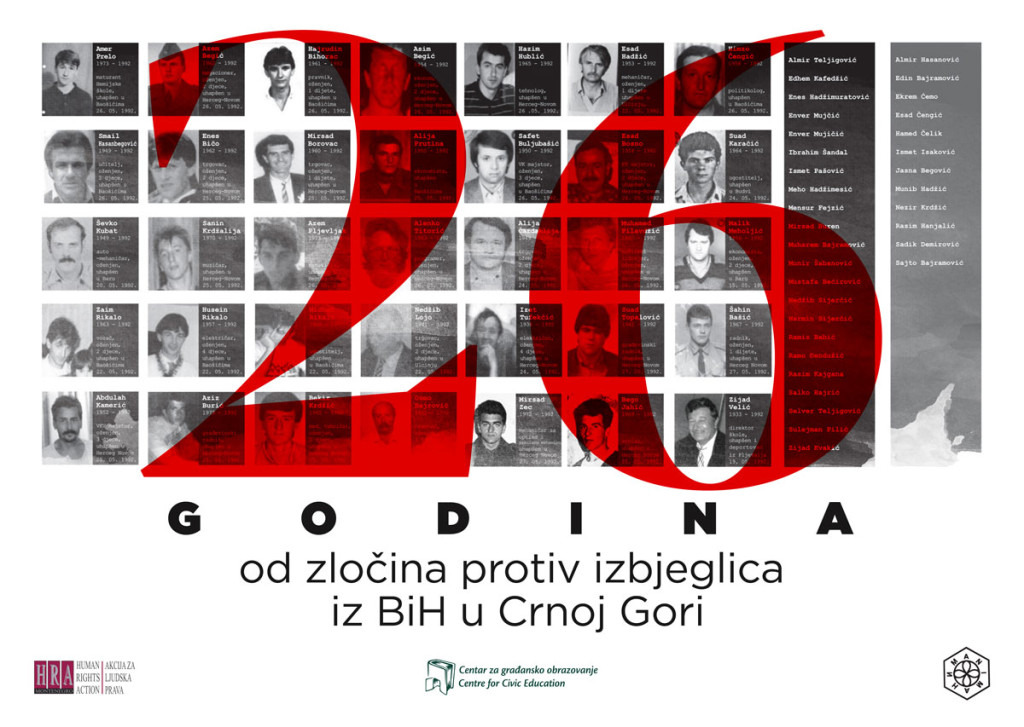26 years from a crime committed against refugees from Bosnia and Herzegovina in Montenegro, known as ‘Deportation of refugees’ came to pass this May.
On Friday, 25 May, in the noon, in front of Police Station of Herceg Novi, wherefrom the majority of victims have been deported to their deaths on 25 and 27 May 1992, non-governmental organisations Human Rights Actions (HRA), Centre for Civic Education (CCE) and Centre for Women’s and Peace Education ANIMA are organising memorial gathering. On this occasion, we will lay flowers and pay respect to the perished victims.
We invite you to join us in marking this sad remembrance. Come to jointly remind ourselves of victims and their families who sought refuge in Montenegro, to show that we condemn this horrid crime against them, to recommit for those who are responsible for crime to be punished, and to build a monument to victims, and thus make joint efforts for war crimes never to be repeated in our country.
We remind that Montenegrin police has unlawfully arrested at least 66 civilians aged from 18 to 66 in May 1992, who have taken refuge in Montenegro from war that blazed in Bosnia and Herzegovina, and that it handed them over as hostages to the army of Bosnian Serbs under leadership of Radovan Karadzic and Ratko Mladic to serve them for exchange of war prisoners. Multiple written documents testify of this fact.
All those who were deported on 27 May 1992 were murdered at once, while the second group has on 25 May been directed to concentration camp in Foča (KPD penitentiary), and only few of them survived the torture. There still have not been found bodies of all victims deported from Herceg Novi on 27 May 1992, nor is it reliably known the place wherein they were murdered.
Victims of this crime are undisputed, Montenegro has paid compensation of damage to their families after four-year trial as per court settlement due to illegal actions of Montenegrin police that brought forth the tragic consequences. It was also determined by criminal conviction in Montenegro that they were unlawfully arrested and deported as hostages, as well as by conviction of The Hague Tribunal in the case Krnojelac (commander of camp in Foča).
However, it is disputable that courts in Montenegro did not find strength in all of that to recognise the war crime and to punish it. By conviction of the Higher Court in Podgorica (valid from 17 May 2013 when the Appellate Court of Montenegro upheld it) nine of accused former officials of police, MI and State Security were acquitted for war crime against civilian population since they allegedly did not have a status of ‘member of conflict party in BIH’, and not even of those ‘who were in the service of a conflict party in BIH’, which according to wrong interpretation of Montenegrin courts was necessary in order to deem they committed a war crime. Afterwards, the expert of the European Union, the Italian prosecutor and international judge Maurizio Salustro, highlighted in his report on prosecution of war crimes in Montenegro that such interpretation is wrong, unknown in the international humanitarian law and practice. Supreme State Prosecution of Montenegro (SSP) has submitted a request for protection of legality on 25 March 2015 requesting from the Supreme Court to determine that law was breached by conviction for the benefit of the accused, but the Supreme Court rejected this request in October of the same year. Since also the Constitutional Court of Montenegro repelled the complaint of families of victims, a group of mothers, daughters and sisters of perished victims has submitted an application to the European Court of Human Rights because Montenegro did not provide criminal justice in this case and respected the human right to life and prohibition of torture.
HRA, CCE and ANIMA and the President of the Council for Civilian Control of Police Work, Aleksandar Sasa Zekovic, have submitted three initiatives five years ago:
- To then President of Parliament of Montenegro Ranko Krivokapic and all heads of MP clubs for Remembrance Day of Victims of War Crime Deportation of Refugees 1992 to be proclaimed;
- To then President of Government of Montenegro Igor Luksic, Minister of Interior Ivan Brajovic and Minister of Culture Branislav Micunovic, as well as the then President of Parliament of Municipality of Herceg Novi, Dejan Mandic – for a memorial to be built for victims of deportation of refugees 1992 in front of building of Police Administration in Herceg Novi, supporting thus also the wish of families of deported victims;
- To the Minister of Interior for Montenegrin police to make an apology due to illegal conduct during arrest and deportation of refugees to, for them, hostile army in Serbian Republic BIH.
None of these initiatives were accepted to this day.
Representatives of political parties and Minister of Interior in Government of Montenegro Mevludin Nuhodzic were especially invited to tomorrows gathering.
Tea Gorjanc Prelevic, Executive Director of Human Rights Actions (HRA)
Daliborka Uljarevic, Executive Director of Centre for Civic Education (CCE)
Ljupka Kovacevic, Coordinator of Centre for Women’s and Peace Education ANIMA

